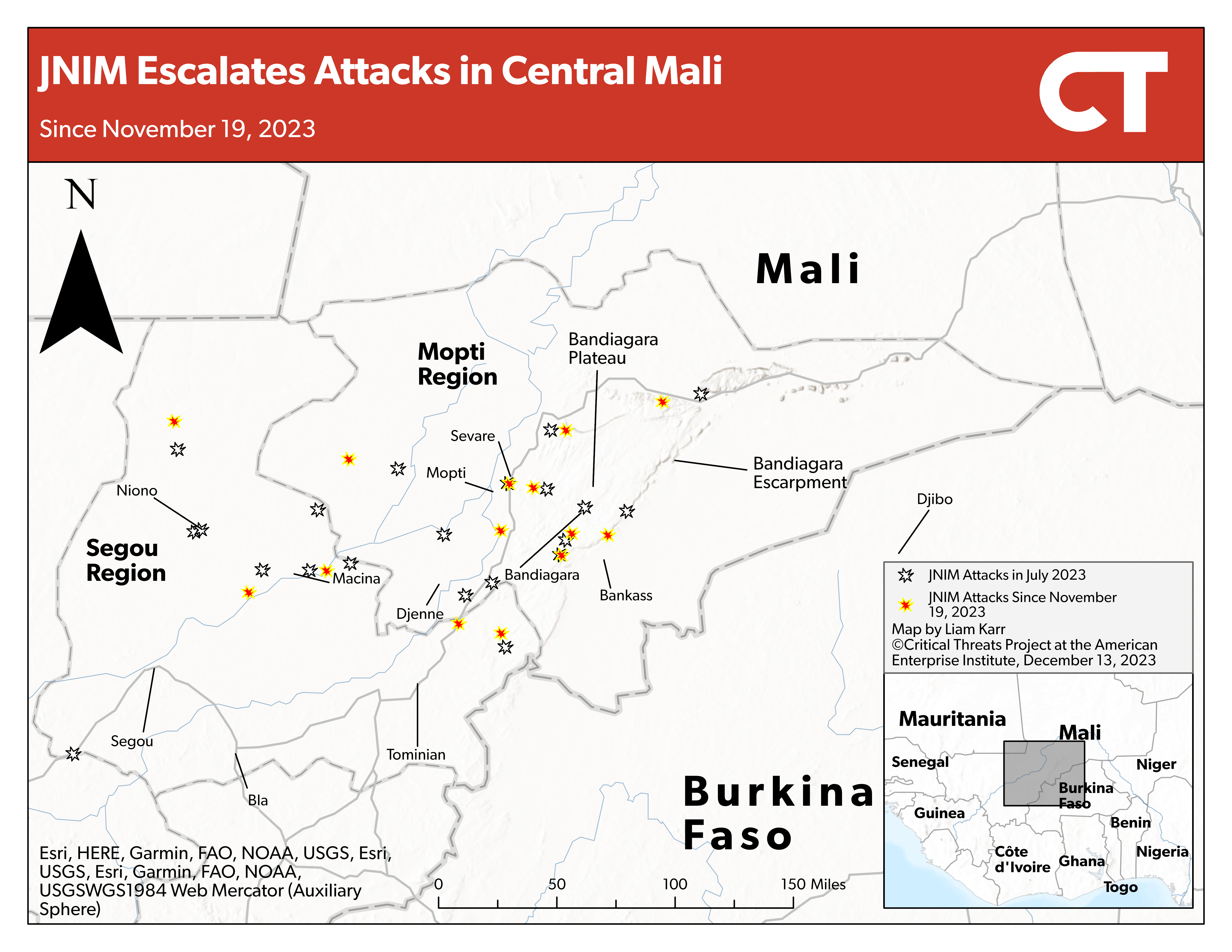 |
 |
Salafi-Jihadi Movement Weekly Update, December 15, 2023

Salafi-Jihadi Movement Weekly Update, December 15, 2023: Al Qaeda Strengthens in Central Mali
Author: Liam Karr
To receive the Salafi-Jihadi Movement Weekly Update via email, please subscribe here. Follow CTP on Twitter, LinkedIn, and Facebook.
CTP has temporarily paused the Afghanistan, Iraq and Syria, and Pakistan sections of the Salafi-Jihadi Weekly Update to support the production of CTP’s Iran Update, which is covering the latest Israel-Hamas war. This update will continue to cover the Salafi-jihadi movement in sub-Saharan Africa on a weekly basis in the interim.
CTP is temporarily pausing the Salafi-Jihadi Movement Weekly Update for the holiday period and will resume publishing the week of January 3.
Data Cutoff: December 13, 2023, at 10 a.m.
Key Takeaway: Al Qaeda–linked militants are increasing their rate of attack in central Mali, likely to coerce civilians into submission to strengthen support zones and gain more resources to help the group isolate Malian forces in the area. Malian security forces and their Kremlin-funded Wagner Group auxiliaries will likely fail to protect civilians from the attacks because Malian forces cannot effectively contest insurgents in central Mali as they continue to give priority to fighting Tuareg rebels in northern Mali. UN forces that helped secure roads in the region are also no longer around to mitigate security gaps after withdrawing in early December. The insurgents will likely use strengthened support zones in central Mali to besiege major population centers and attack isolated security forces in Mali and Burkina Faso to delegitimize both countries’ governments.
Al Qaeda’s Sahelian affiliate Jama’at Nusrat al Islam wa al Muslimeen (JNIM) is increasing its rate of attacks in central Mali, likely to coerce civilians into submission to strengthen support zones and gain more resources to help the group isolate Malian forces in the area. JNIM has conducted at least 16 attacks in central Mali since November 19.[1] Up to October 2023, the group had decreased its rate of attacks after its most recent offensive in central Mali, in July.[2] Various factors potentially contributed to a lull in attacks, such as seasonal flooding, increased clashes with Malian forces in northern Mali, and the need to reset after the July offensive.[3] The recent uptick is similar to the group’s July offensive in that most attacks target civilians or civilian militias and are concentrated in the Mopti region.[4] Most of the attacks since late November have targeted communities on the Bandiagara plateau that JNIM has historically clashed with and the surrounding roadways that bracket these localities.[5] The attacks have included several mass kidnappings that forced local communities to negotiate with JNIM for the release of hostages.[6]
- JNIM has averaged nearly five attacks per week since November 19, which is a similar pace to previous offensives in late 2022 and July 2023, when the group averaged between four and six attacks per week.[7] The ongoing offensive, like the July offensive, is more concentrated in the Mopti region, with roughly 69 percent of the attacks occurring in Mopti in both periods compared to 58 percent in late 2022.[8] JNIM has also targeted civilians and civilian militias at a slightly greater proportion in the two recent offensives, with 64 percent of attacks in July 2023 and 62 percent of attacks since November 19, compared to 58 percent of attacks in late 2022.[9]
- JNIM has regularly fought the Dogon and Bambara communities in central Mali since arriving there in 2016 as part of its efforts to exploit ethnic tensions to gain local support.[10] The traditionally sedentary Bambara and Dogon farming communities have historically clashed with mainly nomadic Fulani herders over access to resources.[11] The JNIM subgroup in central Mali—the Macina Liberation Front—takes advantage of these tensions to recruit from Fulani communities, which has led to escalating cycles of ethnic violence in central Mali since JNIM’s arrival.[12]
Figure 1. JNIM Escalates Attacks in Central Mali
Source: Liam Karr.
Security forces will likely fail to protect civilians from the JNIM attacks because Malian forces cannot effectively contest JNIM in central Mali. The security forces are giving priority to fighting Tuareg rebels in northern Mali, and UN forces that helped secure roads in the region are no longer around to mitigate security gaps after withdrawing in early December.[13] Malian and Wagner Group forces have significantly decreased their rate of counterinsurgency operations and overall presence in central Mali since the junta gave priority to fighting Tuareg rebels in northern Mali in August.[14] Armed Conflict Location and Event Data (ACLED) Project data shows that security forces have nearly halved their activity in the Mopti region since August, compared to the first seven months of 2023.[15] An increase in security force activity in early 2024 would indicate that seasonal flooding, and not capacity issues stemming from the Malian offensive in northern Mali, is driving the current downturn in activity. UN forces also withdrew from their final base in central Mali in early December as part of the broader UN departure from Mali by the end of 2023.[16] UN forces helped relieve the economic pressure that JNIM attacks inflict on targeted communities by patrolling and repairing affected roadways.[17]
- The ACLED Project database shows that average monthly engagements by Malian and Wagner Group forces across central Mali decreased from 32.5 during the January–July period to 21 since August.[18] A decrease in security force activity in the Mopti region is leading this broader downturn, as the average monthly engagements in Mopti nearly halved from 20.5 to 11 over the same periods.[19] The average number of state-initiated engagements in Mopti per month—which removes roadside improvised explosive device (IED) attacks where JNIM is the instigator from consideration—has more than halved from 14.4 to 6.25.[20] These trends show that security forces are projecting less counterinsurgency pressure and are generally less active across central Mali since August, especially in the Mopti region.
- UN forces previously helped mitigate some security gaps in central Mali by patrolling roads and repairing sabotaged infrastructure.[21] However, the mission finished closing the last of three major bases in the Mopti region in Sevare on December 9 as part of the broader UN withdrawal by the end of 2023.[22]
JNIM will likely use strengthened support zones in central Mali to besiege major population centers and attack isolated security forces in Mali and Burkina Faso to delegitimize both countries’ governments. JNIM has regularly used siege campaigns to force localities into negotiations or isolate large population centers.[23] Sieges demonstrate that the state cannot protect civilians or provide basic services and often lead to negotiations with local leaders that cut cooperation with security forces.[24] These agreements isolate security forces from the communities they need to protect and win over to defeat an insurgency. Losing community support also degrades security forces’ ability to gather local intelligence to defend from imminent attacks. Stronger support zones will grow the available resources and space JNIM needs to orchestrate the roadside ambushes and IED attacks that underpin these sieges.
JNIM has launched large and sophisticated attacks against towns with military bases in central Mali and northern Burkina Faso in 2023 and used vehicle-borne IEDs (VBIED) in at least five such attacks.[25] JNIM does not seek to hold large population centers with these attacks and risks sustaining significant casualties from drone strikes by having its fighters hold their positions for too long.[26]
The attacks enable JNIM to influence the local population despite its lack of territorial control, however. The attacks undermine the legitimacy of the state by showing security forces’ ineffectiveness. Militants will also directly intimidate and threaten civilians during the attacks. JNIM overran a military base in central Mali’s Segou region on December 12 in a town the group has besieged for at least two years and demanded that the locals permanently leave after the attack.[27] Strengthened support zones will give JNIM access to more resources and space to stage such attacks. Towns with prominent military bases along key roads—such as Douentza and Sevare—remain high-value targets for JNIM.
- JNIM has implemented shadow governance in dozens of smaller villages in central Mali by securing favorable agreements through threats of violence or siege since 2017.[28] The deals decrease violence against civilians and allow local activity to resume in exchange for residents agreeing not to cooperate with security forces and sometimes adhering to aspects of shari’a law.[29]
- JNIM launched three simultaneous raids involving suicide VBIEDs against Malian army camps in Bapho, Niono, and Sevare towns in central Mali on April 24.[30] JNIM launched another two simultaneous attacks involving suicide VBIEDs in the Mopti and Segou regions on July 24.[31] The group also briefly captured the military base in the besieged provincial capital of Djibo in northern Burkina Faso on November 26 and entered the town for several hours before withdrawing.[32] Burkinabe officials released footage of drone strikes that targeted the attacking militants and claimed the strikes killed hundreds.[33]
- JNIM overran a Malian army camp in Farabougou, Niono cercle, Segou region, on December 12.[34] The attack killed at least five civilians and several dozen soldiers.[35] JNIM cut internet access to the area and threatened residents to not return to the town before retreating.[36] JNIM has besieged Farabougou with periodic cease-fires since 2020.[37]

[1] https://twitter.com/ocisse691/status/1726265802394058871; https://twitter.com/StudioTamani/status/1727765331349774469; SITE Intelligence Group, “JNIM Bombs FAMa and Wagner Vehicles in Mali, Attacks VDP Positions in Burkina Faso,” November 24, 2023, available by subscription at www.siteintelgroup.com; https://twitter.com/StudioTamani/status/1727765331349774469; https://twitter.com/ocisse691/status/1729572611263193309; https://twitter.com/oumaragg/status/1729577885998952793; https://twitter.com/ocisse691/status/1729573887107534857; https://twitter.com/ocisse691/status/1729761797090037986; https://twitter.com/Wamaps_news/status/1730548688009765316; SITE Intelligence Group, “JNIM Claims Rocket Strike on Joint FAMa-Wagner Base in Kidal, Killing Russian Mercenary in Same Malian Region,” December 6, 2023, available by subscription at www.siteintelgroup.com; https://x.com/ocisse691/status/1733797134007140597?s=20; https://x.com/BocaryGUINDO/status/1733828578846912556?s=20; https://x.com/BocaryGUINDO/status/1733815859397669030?s=20; https://x.com/ocisse691/status/1733797129691263112?s=20
[2] https://www.criticalthreats.org/analysis/salafi-jihadi-movement-weekly-update-august-9-2023
[3] https://www.gfdrr.org/sites/default/files/publication/mail_low.pdf; https://acleddata.com/2023/09/21/fact-sheet-attacks-on-civilians-spike-in-mali-as-security-deteriorates-across-the-sahel
[4] Author’s database of significant activity (SIGACT). Available by request.
[5] https://www.crisisgroup.org/africa/sahel/mali/293-enrayer-la-communautarisation-de-la-violence-au-centre-du-mali; https://www.iiss.org/online-analysis/online-analysis//2019/06/conflicts-in-mali
[6] https://twitter.com/Wamaps_news/status/1722240831757967577; https://twitter.com/ocisse691/status/1729573887107534857; https://x.com/BocaryGUINDO/status/1733815859397669030?s=20; https://www.studiotamani dot org/151388-insecurite-a-bandiagara-le-nouveau-mode-operatoire-des-groupes-armes
[7] Author’s database of SIGACTs. Available by request.
[8] Author’s database of SIGACTs. Available by request.
[9] Author’s database of SIGACTs. Available by request.
[10] https://www.crisisgroup.org/africa/sahel/mali/293-enrayer-la-communautarisation-de-la-violence-au-centre-du-mali; https://www.iiss.org/online-analysis/online-analysis//2019/06/conflicts-in-mali
[11] https://africacenter.org/spotlight/mitigating-farmer-herder-violence-in-mali
[12] https://www.iiss.org/online-analysis/online-analysis//2019/06/conflicts-in-mali
[13] https://peacekeeping.un.org/en/closure-of-minusma-camp-sevare-mopti-region
[14] https://www.criticalthreats.org/analysis/salafi-jihadi-movement-weekly-update-october-25-2023; https://acleddata.com/dashboard/#/dashboard; author’s database of SIGACTs. Available by request.
[15] https://acleddata.com/dashboard/#/dashboard
[16] https://peacekeeping.un.org/en/closure-of-minusma-camp-sevare-mopti-region
[17] https://minusma.unmissions.org/en/closure-minusma-camp-sevare-mopti-region; https://x.com/UN_MINUSMA/status/1286271810137477121?s=20
[18] https://acleddata.com/dashboard/#/dashboard
[19] https://acleddata.com/dashboard/#/dashboard
[20] https://acleddata.com/dashboard/#/dashboard
[21] https://minusma.unmissions.org/en/closure-minusma-camp-sevare-mopti-region; https://www.crisisgroup.org/africa/sahel/mali/minusma-crossroads
[22] https://minusma.unmissions.org/en/closure-minusma-camp-sevare-mopti-region; https://peacekeeping.un.org/en/closure-of-minusma-camp-sevare-mopti-region
[23] https://www.crisisgroup.org/africa/sahel/mali/mali-enabling-dialogue-jihadist-coalition-jnim; https://www.thenewhumanitarian.org/2022/05/04/we-accept-save-our-lives-how-local-dialogues-jihadists-took-root-mali; https://www.icwa.org/mali-insurgents-agreements
[24] https://www.thenewhumanitarian.org/2022/05/04/we-accept-save-our-lives-how-local-dialogues-jihadists-took-root-mali; https://www.icwa.org/mali-insurgents-agreements
[25] https://www.jeuneafrique.com/1341823/politique/mali-trois-camps-de-larmee-attaques-par-des-terroristes; SITE Intelligence Group, “JNIM Reports Control over Malian Army Post Following Attack in Mopti, Details 4-Man Suicide Raid on Russian PMC Wagner Group in Segou,” July 27, 2023, available by subscription at www.siteintelgroup.com; https://x.com/ocisse691/status/1683594569659629568?s=20
[26] https://x.com/ZagazOlaMakama/status/1729820594781192354?s=20; https://apnews.com/article/burkina-faso-djibo-rebels-islamic-state-al-qaida-a6dd07b6d587156a8ba48b352c3ae238
[27] https://x.com/Wamaps_news/status/1734951822782058853?s=20
[28] https://www.crisisgroup.org/africa/sahel/mali/mali-enabling-dialogue-jihadist-coalition-jnim
[29] https://www.thenewhumanitarian.org/2022/05/04/we-accept-save-our-lives-how-local-dialogues-jihadists-took-root-mali; https://www.icwa.org/mali-insurgents-agreements
[30] https://www.jeuneafrique.com/1341823/politique/mali-trois-camps-de-larmee-attaques-par-des-terroristes
[31] SITE Intelligence Group, “JNIM Reports Control over Malian Army Post Following Attack in Mopti, Details 4-Man Suicide Raid on Russian PMC Wagner Group in Segou”; https://x.com/ocisse691/status/1683594569659629568?s=20
[32] https://www.france24.com/en/africa/20231128-armed-groups-carry-out-major-attack-in-northern-burkina-faso-say-security-sources; SITE Intelligence Group, “JNIM Video Documents Large-Scale Raid in Burkinabe Town of Djibo,” November 30, 2023, available by subscription at www.siteintelgroup.com
[33] https://x.com/ZagazOlaMakama/status/1729820594781192354?s=20; https://apnews.com/article/burkina-faso-djibo-rebels-islamic-state-al-qaida-a6dd07b6d587156a8ba48b352c3ae238
[34] https://www.thedefensepost.com/2023/12/14/jihadist-attack-central-mali; https://x.com/Wamaps_news/status/1734951822782058853?s=20; https://x.com/NiangAbdoul15/status/1734873870778122313?s=20
[35] https://www.thedefensepost.com/2023/12/14/jihadist-attack-central-mali; https://x.com/Wamaps_news/status/1734951822782058853?s=20; https://x.com/NiangAbdoul15/status/1734873870778122313?s=20
[36] https://x.com/Wamaps_news/status/1734951822782058853?s=20
[37] https://www.state.gov/reports/country-reports-on-terrorism-2020/mali; https://www.crisisgroup.org/africa/sahel/mali/mali-enabling-dialogue-jihadist-coalition-jnim
